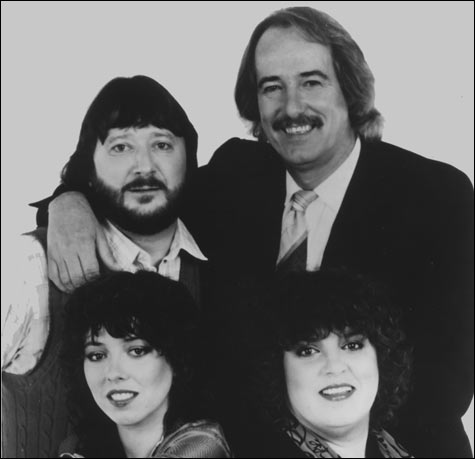
PRIVILEGED DISENGAGEMENT: John Phillips, from the top-right Papa, is a pleasant, slight record. |
Between Phil Spector’s becoming rock and roll’s first teen millionaire and the rock tycoons who emerged some decades later lies the rise of the hippie aristocrat. This was almost always a Southern California phenomenon, and that was fitting, because the hippie aristocrats tried to live like the latter-day incarnation of old-time movie stars, often moving into mansions once inhabited by those stars, and dressing in a funky approximation of classic Hollywood glamor.
You get a taste of this in the photos accompanying the CD re-release of John Phillips’s 1970 solo album John Phillips (John, The Wolfking of L.A.) (Varese Sarabande). Phillips, in white suit and flowing silk scarf, poses in some leafy bower, upstaged only by the peacock perched on a stone wall, or, in the same Sir Good Humor get-up, holding a goblet of wine while standing in front of an enormous oil painting in a tastefully underlit room. A fur coat is tossed carelessly over a sofa, and Tiffany lamps edge in from each side of the photo.

The same tone of privileged disengagement extends to the album, the lone piece of solo work Phillips released until, a few decades later, he emerged from one of rock and roll’s more notorious drug hazes. At the time John Phillips was released, the Mamas and the Papas, who had busted up in a mass of bad vibes and tangled romances, seemed to belong to an already distant past. If the group cultivated an image of hippie chic, particularly the gaunt, goateed Phillips in his ubiquitous fur hats, they were also out of synch with the decade, owing much of their sound to the harmonies of the ’50s white vocal groups rock and roll had supplanted. This album didn’t find an audience, though in the years since it’s come to be regarded as a lost classic. This new reissue adds eight bonus tracks including the single version of its best track, “Mississippi,” which peaked at #32.
Is it a classic? No. It’s a pleasant, slight record, redolent of a time when hippie expansiveness had turned inward to become a solipsistic preoccupation with good vibes and good dope. Phillips goes for a laid-back country-rock tone, and he’s lucky enough to have session pros like Hal Blaine, Larry Knetchel, and above all the great James Burton, who had done stellar guitar work for Ricky Nelson and Elvis Presley. Nothing is forced, but nothing much is sought. Phillips’s wispy voice (the powerful male vocals you remember from the Mamas and the Papas came from Denny Doherty, who died in his native Canada just a few weeks back) blends right into the drifting, laissez-faire tone.
That sense of not-much-going-on is epitomized by the opening “April Anne,” a roman-à-clef about a female friend’s lovers in which Phillips sings, as if it were just another dreamy-tender line, “And your jingle-jagged faggot friend is dead.” That may be a mark of an era when homophobia was acceptable. But there’s a grisly coincidence that hints at the discontent lurking under the album’s surface. The man Phillips is singing about is Steve Brandt, a gossip columnist for Photoplay who, at 30, depressed over the Sharon Tate murders, killed himself via drug overdose. So the reality of Manson worms its way into the SoCal idyll Phillips sings of. And it’s what makes the edge of reserve he gives a line like “Malibu people really know how to live” more convincing than the song’s silly image of a pregnant woman giving birth in the sand.
It’s too much to suggest that Phillips is offering a critique of a lifestyle he seems to be celebrating. When he sings about how beautiful his lady love looked standing next to the beggars in Tangiers . . . well, no satirist could top that degree of self-involvement. But, my God, this is a restless album. The lord-of-the-manor wandering he sings about in “Topanga Canyon” — going to meet his pusher, heading out to the farmer’s market — is followed by the plea “Oh, Mary, I’m in deep water/And it’s way over my head.” “Mississippi,” a fantasy of playing the Bourbon Street dandy, is a temporary respite. And, inspired by Phillips’s cross-country drives, the closing “Holland Tunnel” — with its images of stopping at HoJo’s for an order of clams and hocking jewelry in Pittsburgh and the way Phillips makes paying the toll at the Jersey Turnpike the beginning of some grand uncertain journey — is about as melancholy an ode to freedom as you’re likely to hear. At the end of “A Christmas Carol,” Scrooge finds that nearly anything can bring him pleasure. This album is the sound of a man who could have had nearly anything and found that nothing brought him pleasure.